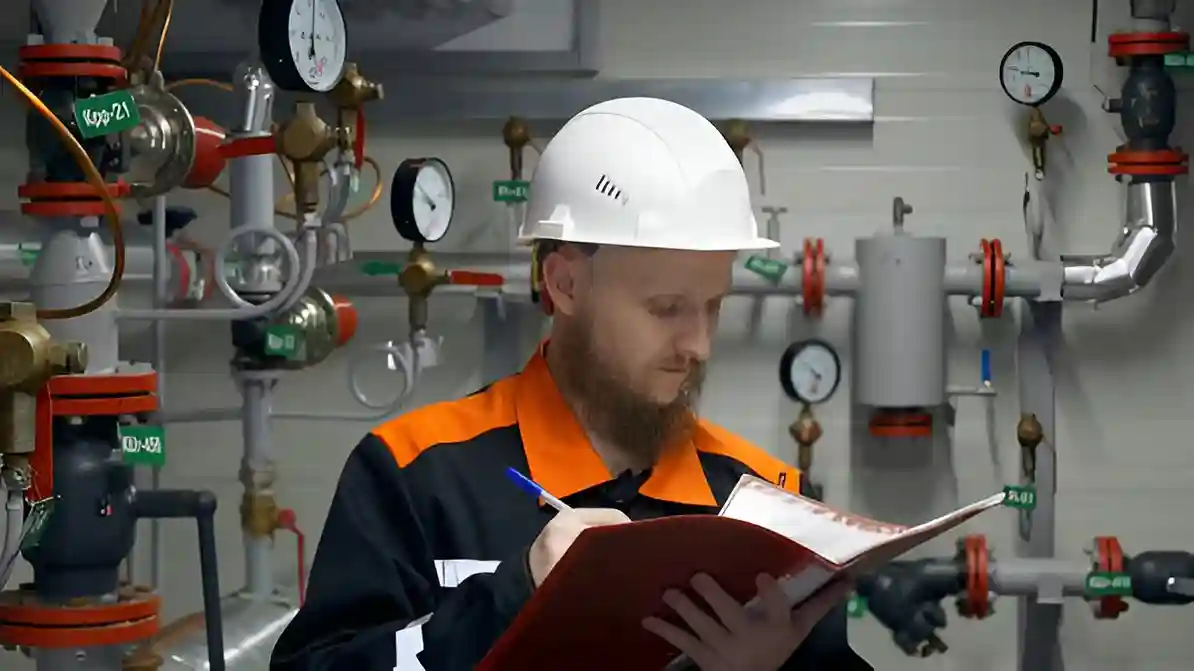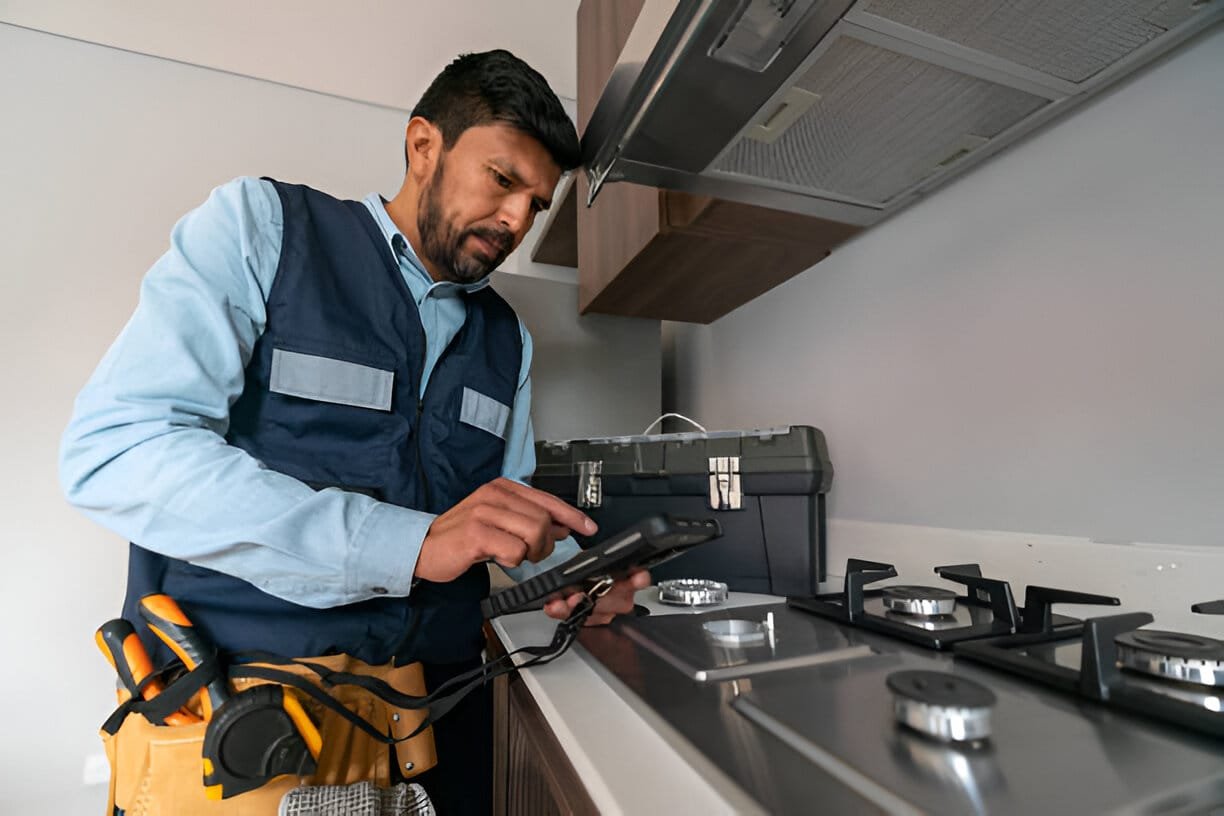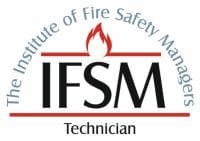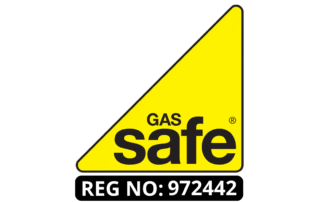
The Gas Safety Certificate is an essential document for landlords, ensuring the safety of gas appliances in rental properties. It acts as proof of legal compliance and helps protect tenants from potential dangers. Understanding the details of this certificate is primary for landlords. What specific legal obligations must they meet? And how can they ensure their properties stay safe and compliant? The answers might surprise you.
Main Points
- Landlords are required to perform yearly gas safety inspections and give tenants a Gas Safety Certificate within 28 days after the inspection.
- The Gas Safety Certificate remains valid for 12 months and requires yearly renewal to maintain compliance.
- Landlords must keep gas appliances in good condition and respond quickly to urgent gas problems.
- Non-compliance may lead to severe penalties, such as fines of up to £30,000 and possible legal proceedings.
- Maintaining precise records of inspections and certifications helps ensure compliance and reduces liability risks.
What Is a Gas Safety Certificate for Landlords?
A Gas Safety Certificate for landlords is an important document that confirms the safety and adherence to regulations of gas appliances in a rental property. It is issued following a comprehensive inspection by a qualified Gas Safe registered engineer, who evaluates all gas appliances, flues, and setups to ensure they comply with safety standards.
The inspection involves examining several factors, such as detecting gas leaks, ensuring adequate ventilation, and verifying that all appliances function efficiently and safely.
Landlords are required to renew this certificate annually to comply with legal requirements, thereby ensuring the safety and confidence of their tenants. The certificate details each inspected appliance, the engineer’s conclusions, and any recommended repairs.
It functions as proof of compliance and demonstrates a commitment to a safe living environment. Ultimately, the Gas Safety Certificate is essential for safeguarding tenants and ensuring landlords meet their gas safety responsibilities.
Why Every Landlord Needs a Gas Safety Certificate
Understanding the significance of a Gas Safety Certificate for landlords is essential, as it meets legal requirements and emphasises tenant safety. A valid certificate verifies that a qualified engineer has inspected the gas appliances, confirming they are safe and functioning correctly. This proactive approach helps minimise risks such as gas leaks, carbon monoxide poisoning, and other risks.
| Benefit | Description | Impact |
|---|---|---|
| Legal Compliance | Avoids penalties and legal repercussions | Protects the landlord from fines |
| Tenant Confidence | Enhances tenant trust in property management | Increases tenant retention |
Legal Requirements of Gas Safety Certificate for Landlords in the UK
While UK landlords are legally required to ensure the safety of gas appliances in their properties, understanding the specific steps to obtain a Gas Safety Certificate is essential. According to the Gas Safety (Installation and Use) Regulations 1998, landlords must ensure all gas appliances, fittings, and flues are kept in a safe condition.
Landlords must supply tenants with a copy of the Gas Safety Certificate within 28 days after the inspection. Furthermore, they are required to keep records of these checks for at least two years.
Not adhering to these regulations could lead to serious penalties, such as fines and legal actions. By understanding and adhering to these legal requirements, landlords can ensure their tenants’ safety and prevent potential liabilities.

How Often Should Landlords Renew a Gas Safety Certificate?
This certificate ensures that all gas appliances and systems are safe for tenants to use. Not renewing it could lead to significant penalties. The table below outlines important deadlines and regulations for landlords related to the Gas Safety Certificate:
| Requirement | Details |
|---|---|
| Renewal Frequency | Annually |
| Certificate Validity Period | 12 months |
| Inspection Notification | 28 days before expiry |
| Penalty for Non-Compliance | Up to £30,000 or imprisonment |
Landlords need to proactively schedule gas safety checks and renew certificates to prevent lapses. Staying compliant not only ensures tenant safety but also protects the landlord’s legal position and property value.
What Checks Are Included in a Gas Safety Certificate for landlords?
A comprehensive review of gas appliances and installations is essential for guaranteeing tenant safety, as specified in the Gas Safety Certificate. This certificate involves essential inspections to confirm that all gas appliances in the property are safe and operate efficiently.
Inspectors assess gas boilers, cookers, and heaters, looking for signs of leaks, corrosion, or blockages. They also examine the flue systems to ensure proper ventilation and safe removal of gases.
Furthermore, the certificate verifies that all appliances operate in accordance with the manufacturer’s specifications, ensuring they are both safe and energy-efficient. It also includes an inspection of the gas supply pipes and safety devices, such as emergency shut-off valves, to confirm they are in proper working condition.
Finally, the inspector documents the results, which must be shared with the tenants and retained for compliance purposes. This thorough process helps landlords meet their legal duties while focusing on tenant safety.
Who Can Provide a Gas Safety Certificate for Landlords?
Gas Safety Certificates for landlords can only be issued by qualified gas safety engineers who are registered with the Gas Safe Register. This registration confirms they have completed the required training and assessments to handle gas appliances safely and competently.
Landlords ought to employ these certified engineers for yearly gas safety inspections on their rental properties. They will thoroughly check all gas appliances, flues, and installations to ensure they meet safety standards.
After the inspection, a Gas Safety Certificate will be issued if all safety standards are met. Landlords must verify the credentials of the gas safety engineer they hire to ensure the service is legitimate and complies with legal requirements, thereby protecting tenants’ welfare.
Gas Safety Certificate for Landlords: Risks of Non-Compliance
What consequences arise from not having a valid Gas Safety Certificate? Landlords face significant risks, including legal penalties, financial liabilities, and safety dangers. Without this certificate, they may be held responsible for accidents resulting from gas leaks or faulty appliances, which could endanger the lives of tenants.
| Risk | Description |
|---|---|
| Legal Penalties | Fines or prosecution for non-compliance with laws. |
| Financial Liability | Costs from damages or injuries due to gas incidents. |
| Increased Insurance Premiums | Higher rates or denial of coverage by the insurance company. |
| Tenant Eviction | Tenants may terminate leases without notice. |
| Damage to Reputation | Loss of trust among potential tenants. |
Cost of Gas Safety Certificate for Landlords: What to Expect
Landlords need to understand the financial implications of obtaining a Gas Safety Certificate. The cost can vary significantly depending on factors such as the property’s location and the complexity of the gas appliances involved.
Typically, landlords pay between £60 and £120 for a professional inspection and certification. They should also consider possible extra expenses, like repairs for any issues found or additional inspections if serious problems are uncovered during the initial assessment.
Furthermore, since inspections are mandated annually, landlords should budget for this regular expense.
Benefits of Keeping Your Gas Safety Certificate for Landlord Records Updated
Keeping an up-to-date Gas Safety Certificate record provides landlords with several benefits beyond legal compliance. Accurate documentation shows their dedication to tenant safety, building trust and improving their reputation. This proactive strategy reduces the risk of gas-related incidents, which can cause serious issues like property damage and legal consequences.
An updated record also streamlines property management, allowing landlords to supply documentation during inspections or tenant inquiries rapidly. Additionally, it supports adherence to insurance requirements, which can reduce premiums by demonstrating responsible property management.
Furthermore, having a regular schedule for renewing gas safety certificates helps landlords prevent penalties from expired certifications, ensuring financial stability. In the end, keeping organised and up-to-date records protects tenants and also aids landlords in efficient property management and reducing risks.

Landlord vs tenant responsibilities in gas safety compliance
While landlords and tenants both have roles in gas safety compliance, their responsibilities vary significantly. Landlords must ensure that all gas appliances, fittings, and flues are kept in a safe condition, including obtaining a valid Gas Safety Certificate each year. Tenants are responsible for reporting any gas issues to their landlords quickly and for using appliances safely.
The following table outlines the specific responsibilities of both parties:
| Responsibility | Landlord | Tenant |
|---|---|---|
| Gas Safety Checks | Must conduct annual checks | Should report issues promptly |
| Maintenance | Responsible for repairs | Must use appliances safely |
| Documentation | Must provide Gas Safety Cert | Should keep records of reports |
| Emergency Response | Must act on urgent issues | Notify landlord of emergencies |
Understanding these distinctions is essential for guaranteeing a safe living environment.
Frequently asked questions.
Conclusion
In summary, securing a Gas Safety Certificate is essential for landlords to ensure their properties meet safety laws. Regular inspections help prevent dangers, protect tenants, and improve landlords’ reputations while building trust. By understanding legal requirements and keeping records current, landlords can reduce risks and provide a safe living space. Emphasising gas safety is more than just a legal requirement- it demonstrates a dedication to tenant well-being and responsible property management.








